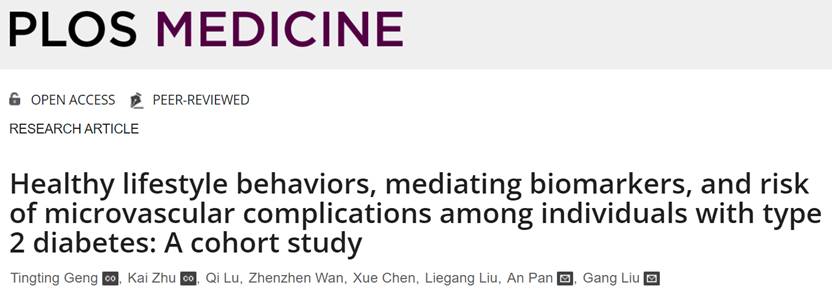Recently, Prof. Liu Gang and Prof. Pan An from the School of Public Health of Huazhong University of Science and Technology have made new progress in the field of healthy lifestyle and microvascular complications of diabetes through teamwork, and relevant research results have been published in the international authoritative journals PLoS Medicine and JAMA Network Open respectively.
On January 10, 2023, PLoS Medicine, an authoritative journal in the field of medicine, published online the latest research results of Prof. Liu Gang and Prof. Pan An's team from the School of Public Health, entitled "Healthy lifestyle behaviors, mediating biomarkers, and risk of microvascular complications among individuals with type 2 diabetes: A short study". Geng Tingting, a postdoctoral fellow of the School of Public Health, and Zhu Kai, a doctoral student, are the co-first authors, and Prof. Liu Gang and Prof. Pan An are the co-correspondents.

Diabetes is a global public health crisis affecting greater than 0.5 billion adults worldwide. Diabetic microvascular complications including diabetic retinopathy, diabetic neuropathy, and diabetic kidney disease have placed a significant health and economic burden borne by individuals, families, and health systems. For example, diabetic retinopathy, the leading cause of vision loss, is present in nearly 30% of patients with diabetes. Furthermore, both diabetic kidney disease and diabetic neuropathy may develop in approximately 50% of patients with diabetes. Therefore, it is paramount to identify cost-effective strategies to prevent and delay the development of microvascular complications in patients with diabetes.
The magnitudes of the joint association of multiple lifestyle factors with the development of microvascular complications in diabetes have not yet been quantified, which may have substantial public health implications on translating epidemiological findings to meaningful public health actions. In addition, several studies have linked lifestyle behaviors with a range of intermediate variables including lipid profile, liver function biomarkers, renal function biomarkers, blood pressure indices, glucose metabolism measures, and systemic inflammatory factors; however, whether and the extent to which these metabolic biomarkers could mediate the association between lifestyle behaviors and diabetic microvascular complications remains unclear.
This retrospective cohort study included 15,104 patients with T2D free of macro- and microvascular complications at baseline (2006 to 2010) from the UK Biobank. Healthy lifestyle behaviors included noncurrent smoking, recommended waist circumference, regular physical activity, healthy diet, and moderate alcohol drinking. Outcomes were ascertained using electronic health records. Over a median of 8.1 years of follow-up, 1,296 cases of the composite microvascular complications occurred, including 558 diabetic retinopathy, 625 diabetic kidney disease, and 315 diabetic neuropathy, with some patients having 2 or 3 microvascular complications simultaneously. Adherence to overall healthy lifestyle behaviors was associated with a significantly lower risk of microvascular complications in patients with T2D, and the favorable associations were partially mediated through improving biomarkers of glycemic control, systemic inflammation, liver function, and lipid profile.
In addition, Prof. Liu Gang, in cooperation with the research team of Harvard University, has also carried out relevant research based on the American nurse health cohort and the health professionals follow-up cohort. The cohort is characterized by various information before and after the diagnosis of diabetes patients. Relevant research results were recently published in JAMA Network Open. Prof. Liu Gang, School of Public Health, Huazhong University of Science and Technology, is the first author.

A total of 7077 patients with type 2 diabetes were included in the cohort (4982 women in NHS and 2095 men in HPFS, mean [SD] age 61 [8.8], 94.2% White). During follow-up, 2878 patients developed microvascular complications. After multivariable adjustment, adherence to a healthy lifestyle before and after diabetes diagnosis were both associated with a lower risk of developing microvascular complications. In this cohort study, adhering to an overall healthy lifestyle was associated with a significantly lower risk of microvascular complications among individuals with diabetes. These findings suggest substantial reduction in the burden of microvascular complications associated with adopting a healthy lifestyle among patients with type 2 diabetes.
The above two studies show that diabetes patients adhere to a comprehensive healthy lifestyle to reduce the risk of microvascular complications in diabetes. At the same time, the above research suggests that healthy lifestyle may reduce the risk of microvascular complications in diabetes by improving blood sugar, blood lipids, inflammation, and metabolic indicators related to liver function. The research results provide an important scientific basis for the health management of diabetes patients.
The research was supported by the National Natural Science Foundation and the Hubei Provincial Fund for Distinguished Young Scholars.
Paper linnk:
https://journals.plos.org/plosmedicine/article?id=10.1371/journal.pmed.1004135
https://jamanetwork.com/journals/jamanetworkopen/fullarticle/2800838
